Suppose you’re a digital marketer, blogger, freelancer, or online business owner. Research keywords should be at the top of your list when trying to increase website traffic and engage more readers. Keyword research in digital marketing is an essential part of marketing that can help you target the right audience for your content and business. In addition, knowing how to do effective keyword research can be a game-changer in optimizing your website’s visibility and getting noticed by potential customers. This blog post will show you some keyword research strategies and techniques on how to do keyword research in 2023 that can help boost engagement with your audience.
Table of Contents
ToggleWhat is keyword Research?

Keyword research is an integral part of any digital marketing strategy. It involves researching what terms and phrases people use when searching for a particular topic, product, or service.
By understanding what words and phrases your audience uses to search for something that you offer, you can better optimize your website with those keywords to rank higher in search engine results.
Keyword research report provides valuable insights into what your potential customers may be looking for and what kind of content they are engaging with online.
Finding good keywords for SEO means a higher chance of appearing in search results, which leads to more visibility and more opportunities for conversions.
So, if you want your website to be seen by a wider audience, investing time and energy into proper keyword analysis SEO is mandatory! Therefore, make sure to complete this article. Then, let’s get started knowing all the hacks for conducting keyword research, like the pros.
What are the 4 Types of Keywords?
The four main types of keywords are short-tail, long-tail, questions, and intent targeting.
- Short-tail keywords: A short-tail keyword is a short, commonly used phrase that consists of two to four words. It’s an excellent way for marketers who want to target more generalized topics and have a broader reach.
Using short-tail keywords can get higher-quality results that are more closely related to your search. This helps improve the chances of finding what you’re looking for quickly and easily and improves your website ranking with search engine algorithms. Overall, short-tail keywords are essential in achieving optimal SEO results!
- Long-tail keywords: Long-tail keywords are longer and more specific than common ones. It helps to capture more organic search engine traffic and bring better results if used correctly. Long-tail keywords help to get higher conversion rates56 because they are less competitive and can provide more qualified leads since they are so specific.
Long-tail keywords prove helpful for optimization, creating more detailed content, supplementing the online presence of your business with quality leads, and boosting overall website performance.
- Questions: A question-based keyword is a search query that starts with a question word like ‘What,’ ‘How,’ ‘Where,’ and ‘Who’. Question-based keywords are typically structured as question phrases that you may enter into the search engine, providing clarity and direction to your results.
It has become increasingly popular with the growth of the internet and search engines. This can help you get the answer you’re looking for without sifting through numerous unrelated website pages.
- Intent Targeting Keywords: Intent Targeting Keywords are one of the essential elements in creating an effective marketing campaign. By understanding what a potential customer is looking for, Intent Targeting helps you target those searches with tailored information to answer their needs. There are four types of intent-targeting keywords: informational, transactional, commercial, and navigational.
- Informational: People searching for answers to a specific question or any general information.
- Navigational: People focus on searching a specific site or page.
- Commercial: People intend to investigate brands or services.
- Transactional: This one refers to taking action or purchasing the product or service.
Why is Keyword Research Important?
Keyword research is important for digital marketing success in today’s competitive environment. Because using the right keywords in your digital marketing efforts- creating website content, writing blog posts, or optimizing search engine campaigns- can increase search engine visibility and bring more relevant visitors to your web pages.
Knowing where most visitors come from and how they interact with your site helps you create content that will appeal to them. You also need to consider related search terms, long-tail keywords, and geographic specifics keywords as part of your faster keyword research strategy to maximize the potential of reaching your desired audience.

This leads to better engaging online experiences, which can result in higher conversions and increased customer loyalty-both of which are enormous wins for any business owner.
Ultimately, performing detailed keyword research and analysis for SEO should be an integral part of any digital marketing strategy if you’re looking to gain an edge over the competition.
Elements of Keyword Research
Elements of keyword research include:
- Identifying relevant keywords for your topic.
- Analyzing search volume data to determine keyword demand.
- Specifying the difficulty level for achieving a high position in search engine results pages (SERPs).
- Finding long-tail phrases that have lower competition from other sites.
Keyword research also involves researching competitors to find out which keywords they are targeting and tracking performance over time by monitoring rankings for each keyword you’re targeting.
There are three core keyword research elements you need to pay attention to.
Relevance: Google’s top priority is delivering the best content for each query. It means Google constantly strives to give users the best content experience possible.
To do this, they take into account search intent – matching valuable resources to specific queries and ensuring your content is up-to-date with industry standards.
Thankfully, if you create valuable and relevant content tailored to a keyword, it stands an excellent chance of ranking higher. This is the best way to do keyword research keeping relevancy always on top element.
Authority: If you want to make sure your content stands out and catches the eye of Google, focus on becoming a trusted source in your field.
Always try to gain authority by providing your visitors with helpful and informative content, sharing it across social channels, and leveraging quality backlinks.
Boosting up the quality of what you put online with helpful information is key- along with spreading it so everyone can see!
However, sites dominate search engine results for particular topics (like Forbes). In that case, it might be an extra challenge – but not impossible if yours is exceptional!
Volume: It’s possible to land in the top spot of a search engine for your chosen keyword – but it won’t do your business any good if nobody is looking for it!
It’s like building a fantastic store in a deserted township with all that effort yet no customers.
So make sure you check out MSV (monthly search volume) when selecting keywords; this reveals how often people type them into their web browsers every month and lets you know whether anybody is searching at all or not.
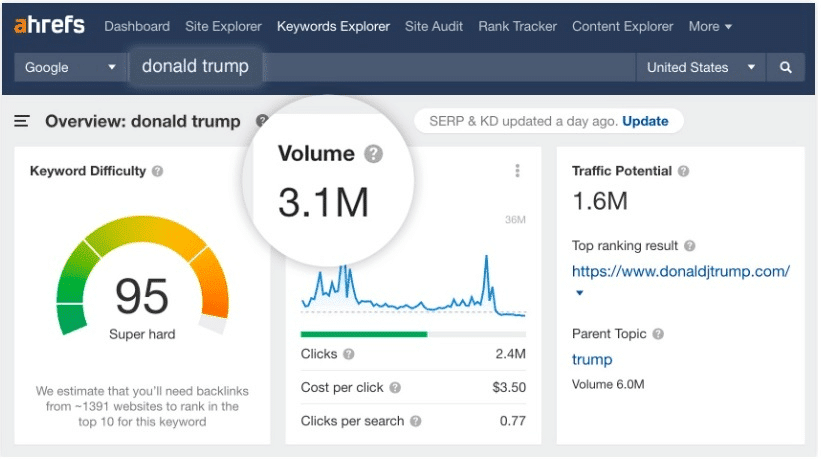
How to Prioritize Keywords for Your Website?
Prioritizing keywords for your website is important if you want to ensure that your content is relevant to potential customers. When prioritizing keywords, it’s best to take a holistic approach to identify the words that resonate best with your target audience.
- Brainstorm “seed” keywords
- See what keywords your competitors rank for
- Use keyword research tools
- Study your niche
Begin by creating a list of all the topics related to your website and products/services. Then, identify the core topics that best represent your services.
These are the keywords you should prioritize first. Do keyword research using keyword suggestion tools like Google Trends, keyword planner, Ahrefs, etc., to confirm which keywords people are searching for most frequently and prioritize those terms one at a time.
How to do Keyword Research for SEO?
This critical aspect of SEO can often go overlooked, but ensuring the right audience finds your content is essential. Finding keywords that best fit your content can be challenging, so here are a few tips on keyword research for blogs or websites you can use when researching for SEO.
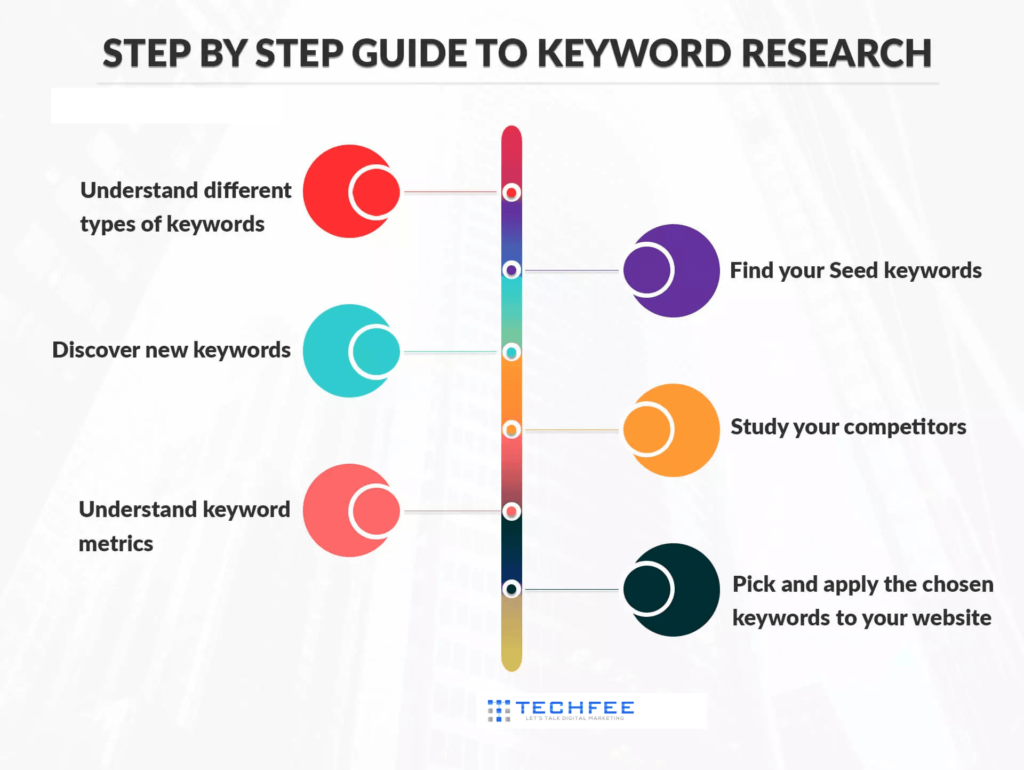
1. Define your goals - what do you want to achieve with your keywords research?
Defining your goals in keyword research is the key to building a successful SEO plan. It helps to focus your strategy on specific terms relevant to your business and audience.
By aligning targeted keywords with your content, you can prioritize objectives like increasing traffic from organic search or improving visibility for targeted services.
Defined goals also focus on the keywords you need for market research, giving you more granular information about where most of the traffic comes from, how each keyword contributes towards the marketing goal and more!
2. Identify your target audience - who are you trying to reach with your website and content?
To be successful in the digital world, it’s essential to identify who you are trying to reach with your website and content. Understanding your target audience will help you create better strategies, content, and connections.
Define the attributes of your target audience, such as age range, occupation, interests, and preferences. Identifying this information can help inform user experience decisions on your website and focus your content creation efforts toward developing helpful content that speaks directly to your audience in a friendly and casual tone.
Knowing who you’re connecting with will ultimately help grow relationships between yourself and those looking for what you offer.
3. Research your competition - what keywords are they targeting, and how can you compete against them effectively?
Understanding what keywords your competition targets can be a great way to gain a competitive edge. In addition, identifying what keywords your competition is targeting can help you create a more effective strategy for reaching out to potential customers.
By looking into the keywords, they are using and their content strategies, you can better assess how you can effectively compete with them.
Researching their keyword analysis SEO efforts also gives you valuable insights that can help you adjust and refine your own keyword tactics.
4. Find the right keyword tool for your needs - there are various options available, so choose one that fits your budget and requirements.
Finding the right keyword tool for your needs can be overwhelming, but you can find what works best with various options available. From free options to high-end subscription models, you can choose one that fits your budget and your specific requirements.
Take time to consider what kind of research and analysis you need, then compare tools to find the one that offers the most convenient features. Once you have identified these, get in touch with customer support, who can likely give more detailed information on which tool could best serve your purpose. It’s all about finding the right tool that works well for you!
5. Conduct keyword research - consider both short-tail and long-tail keywords, as well as local keywords if applicable
When researching your keywords, it is essential to consider both short-tail and long-tail keywords, as well as local keywords if applicable. Short-tail keywords are typically one or two words, while long-tail keywords are phrases that are more specific than the typical one or two words of a short-tail keyword.
Local keywords will also help your content target those within the geographical area you are focused on – such as city, town, or county.
Conducting the proper keyword research can help ensure that the right people see your content, so don’t skip out on this part of the SEO plan and do the appropriate study from every angle!
6. Analyze your results and adjust accordingly - don't be afraid to experiment with different keywords to see what works best for you
Analyzing and adjusting your keyword research results is key to a successful search engine optimization (SEO) strategy. You never know what will work best, so don’t be afraid to experiment with different keywords and see how they perform. Analyze the data you have and make adjustments accordingly. Try other words and phrases, and observe how your website’s position on SERPs changes.
Analyzing can also help you understand what content resonates with which demographics, giving insight into how effectively keywords are actually being used amongst potential customers.
Change up your keywords if necessary – it doesn’t have to be a permanent change. Testing different ones and keeping an eye on your analytics can help you optimize your efforts and get the most out of every search engine optimization campaign you run.
7. Monitor your progress over time - track your website's traffic and see how it responds to changes in your keyword strategy
Keeping track of your website’s progress is essential to successful SEO. Monitor your progress over time by tracking your website’s traffic to see how it responds to changes you make to your keyword strategy. Evaluating your progress is a great way to measure success and understand what works best for your site.
Plus, regular data reviews can help you identify any areas that need additional optimization to ensure maximum visibility and engagement. Monitor and track today, and get on the fast track toward success!
How to Use The Best Keyword Research Tool

Keyword research tools are an essential part of any successful SEO strategy. Knowing the best keyword research tools can make all the difference in driving traffic to your site and helping you rank higher on search engines. These tools help uncover valuable insights into users’ search patterns and analyze keyword trends that can be used to boost your website’s visibility.
Some of the Popular options include:-
1. Google Keyword Planner
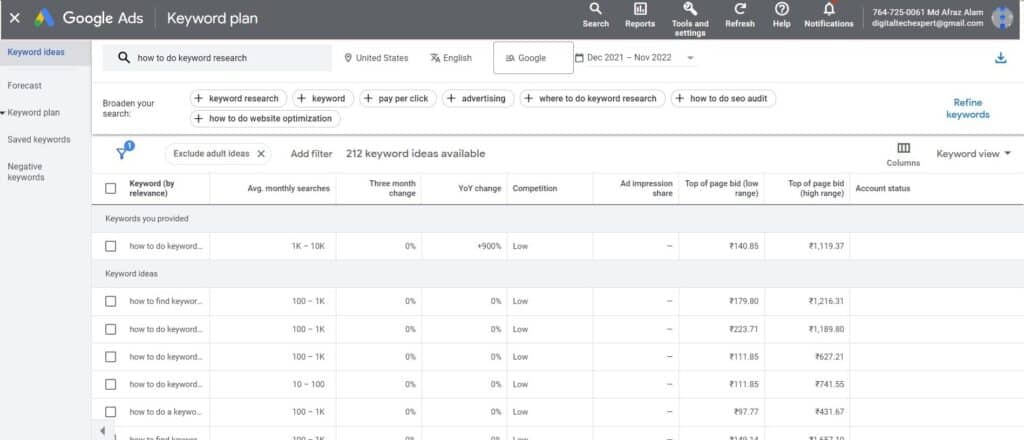
In the google keyword planner, you can enter topics or phrases related to your business or product, and google will then provide you with a list of all relevant terms.
From here, you can get detailed insights into search volume, competition level, and more to find your target audience’s interest.
Google keyword planner may take a while to understand, but it’s worth investing your time in – once mastered, it’ll be an indispensable tool for optimizing your content.
2. Moz Keyword Explorer

Moz Keyword Explorer is an excellent tool for anyone looking to do keyword research. It allows you to access Moz’s massive keyword database, giving you hundreds of potential keywords to use in your content.
Moz Keyword Explorer also has several helpful features that make it easy to narrow down the list of keywords and uncover related searches. With Moz Keyword Explorer, you’ll have an accurate understanding of which keywords to target so that your SEO efforts are correctly focused.
3. Ahrefs Keywords Explorer
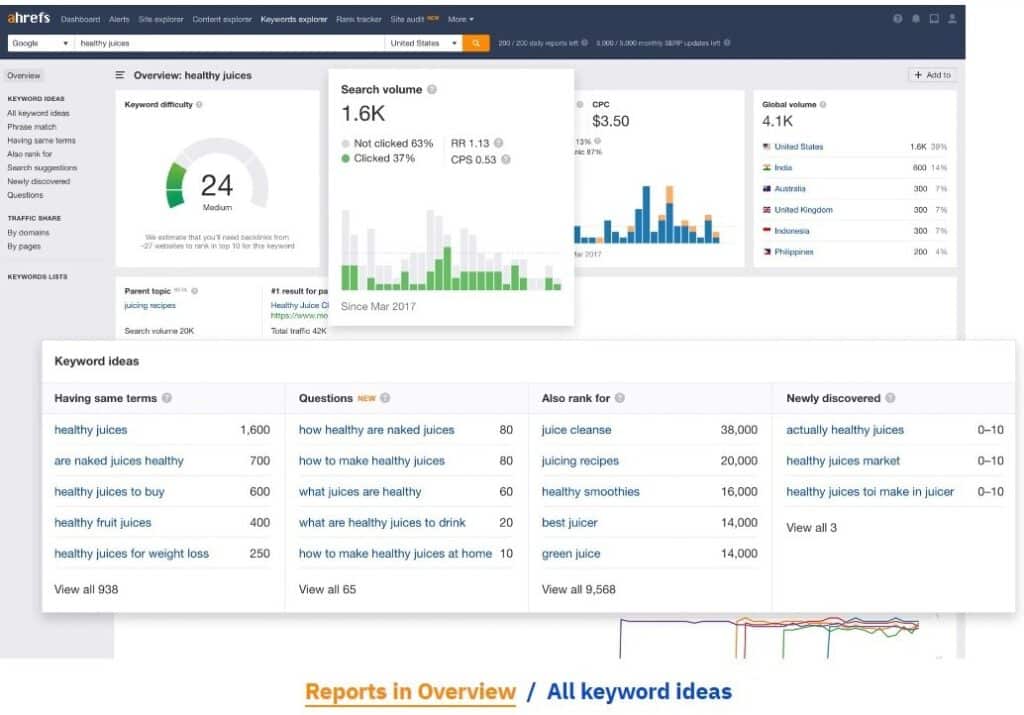
Ahrefs Keywords Explorer is an incredibly useful tool for performing comprehensive keyword research. Ahrefs takes out the guesswork by analyzing each keyword’s volume, difficulty, paid difficulty, potential clicks, and other factors.
Ahrefs provides you with a competitive edge so you can easily target and capitalize on these valuable keywords for maximum success!
You’ll also get access to search volumes and suggested ad groups so that you can choose the right words quickly and with confidence. Ahrefs will save you both time and effort when doing your search engine optimization research, making it easier than ever to create high-ranking content.
4. Ubersuggest
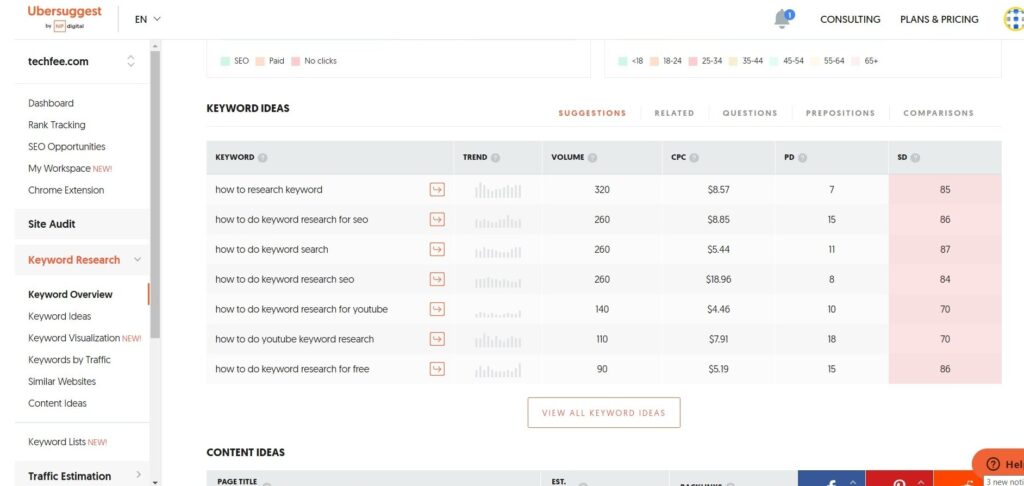
Ubersuggest is an incredibly helpful tool to help identify, organize, and prioritize the most effective keywords for website optimization or general online searches.
With this tool, you can easily explore new keyword opportunities, look up statistics about a specific keyword’s popularity and search volume, and obtain long-tail keyword suggestions – all in one place.
You can even see competitors’ rankings and analyze their website data so that you’re best equipped to optimize yours.
5. Google Search Console
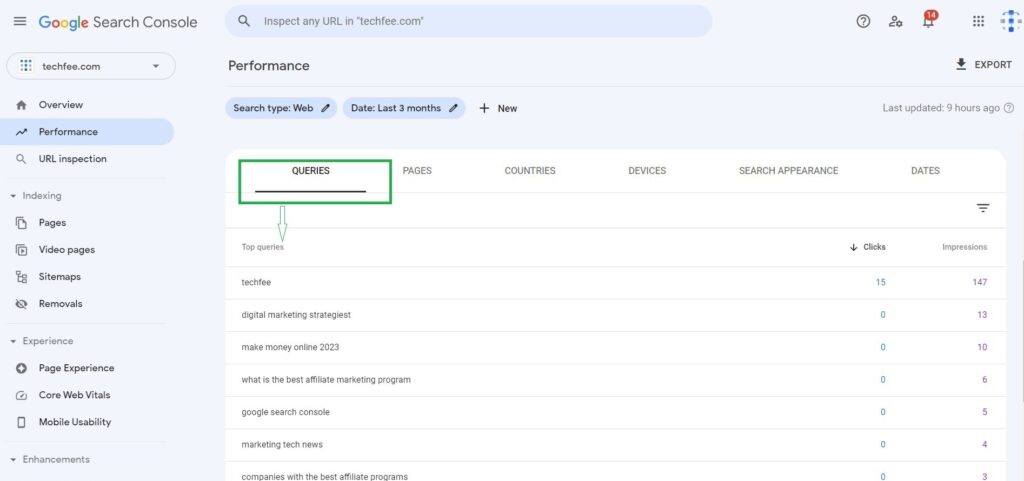
It’s pretty simple: you must log in, select your website, and check out the performance report. This will tell you which search terms people used when they found and clicked on your website. You can even filter this by page or device, so you get an even more precise picture of how people interact with your content and their behavior.
The main areas to focus on when using Google Search Console for your keyword research are discovering what queries people are currently using to find similar sites within your niche, finding potential alternate keywords that could appear more in organic search results, and digging deeper into keyword data with filters and advanced options.
By understanding how these options work in Google Search Console, you can maximize the exposure to your website by optimizing content around those keywords.
6. SEMrush
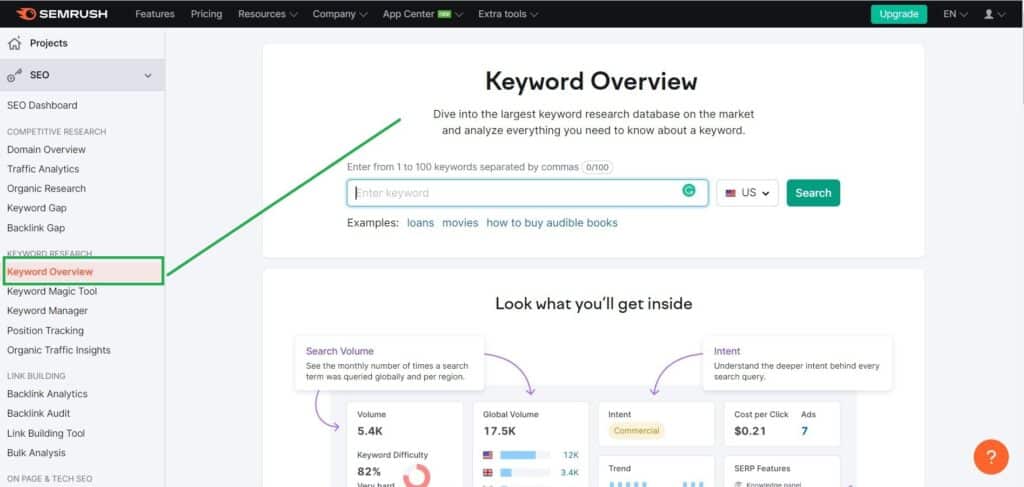
SEMRUSH is an excellent tool for keyword research. It enables you to learn what keywords your competitors are using, identify paid and organic search opportunities, get in-depth insight on keyword metrics such as search volume or position in the SERP, and perform detailed competitor analysis.
Furthermore, SEMRUSH also allows you to quickly analyze trends for any keywords you use to find potential areas of interest for optimization.
You must create an account with SEMRUSH, enter the domain name where you want the research to be focused, then adjust the target country and device type settings if needed. From there, SEMRUSH will show you all the keywords associated with that site.
You can then use filters like geo-distribution, Rank-Volatility, or Ads Payout, to refine your keyword list further and get a better idea of which ones fit best with your business goals.
7. KeywordTool.io
KeywordTool.io is an excellent resource for researching keywords that suit your content strategy. With this tool, you can find dozens of potential new keywords, long-tail phrases, and related terms that will help make your content more readable and accessible to search engine algorithms.
To use KeywordTool.io, enter any seed keyword in the search bar and select your language and location. You will then be presented with up to 760 results related to your initial search term, classified into relevant themes such as ‘widespread’ or ‘similarly named’ keywords.
With these beneficial sets of related words, you can easily research topics, craft high-quality titles, improve the uniqueness of page texts, create new blocks of content, and more!
8. Keyword Snatcher
This user-friendly tool does the hard work for you to find the very best keyword suggestions related to your subject matter. With Keyword Snatcher, enter your primary keyword and let the software do the rest.
You’ll get access to dozens of related keywords that can help you optimize content production, build effective SEO strategies, and improve website traffic – all with ease.
9. Google Trends
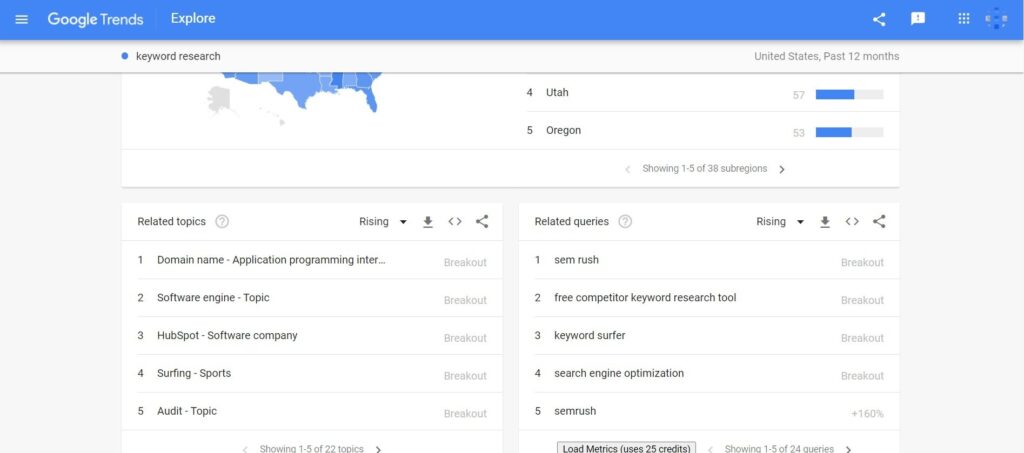
It’s one of the most comprehensive and helpful methods out there, and it can make all the difference when deciding which terms to focus on while crafting your content.
With Google Trends, you’ll get detailed insights into user interest over time and related searches that can offer fresh ideas that could help you create more successful content. Plus, it’s completely free to use!
You’ll also get access to the latest related news stories – great for staying up-to-date with what people are talking about online.
So if you’re interested in keeping pace with popular topics, give Google Trends a try today—it’s an invaluable resource for keyword research.
10. Keywords Everywhere
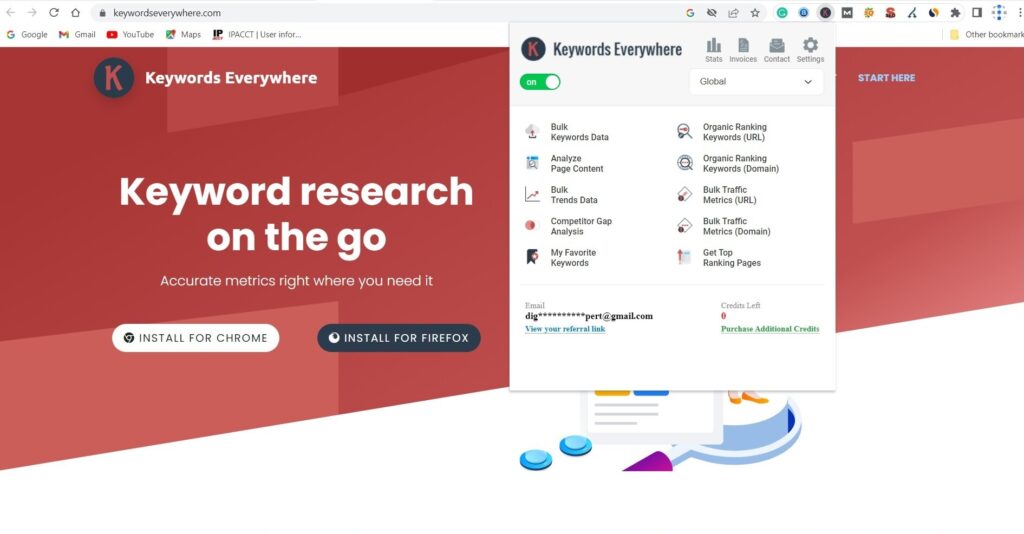
Fortunately, Keywords Everywhere is here to help. The tool provides keyword suggestions to help you narrow down your research quickly and start writing content tailored to those searches.
To use the tool, type in your seed keyword, and Keywords Everywhere will provide you with related words to give you direction with your research. You can enable this tool as a chrome extension as well.
Moreover, you’ll also be able to see metrics such as CPC rate and search volume for each keyword suggestion making it easier for you to make data-driven decisions for your content marketing strategy.
11. KWFinder
It’s simple to use and provides many compelling features that make keyword research more accessible than ever. To get started, you must enter the keyword or phrase into the search bar.
KWFinder does the rest by providing related keywords from multiple sources, semantically related keywords, monthly searches, Cost Per Click (CPC) rates, and more!
You can filter your results by region or language to get even more precise results. You can also discover niche-specific suggestions with its unique “related” option. KWFinder makes keyword research simple, efficient, and accurately fulfilling.
Each one provides data such as monthly searches, competition level, and suggested related keywords that can be used to build optimized content for your audience and get discovered by more customers. The right keyword research tool can revolutionize your content strategy and help boost your site in Google’s rankings.
Conclusion
Keyword research is essential if you want to boost your website traffic. It helps you understand what people are searching for and allows you to create content that meets their needs. There are a few elements of keyword research that you should keep in mind, including how to prioritize keywords and how to use the best keyword research tool. If you follow these tips, you’ll be on your way to increasing your website traffic in no time.
I hope this article helped clear some confusion about keyword research and its importance for your website. Let me know in the comments below if you have any confusion or questions. I’m always happy to help! Have fun boosting your website traffic!
Frequently Asked Questions
When do you need keyword research?
When crafting content for your website, you need to consider how to ensure it can be found. That's where keyword research comes in! When you do your keyword research, it unlocks which words are most searched and how those words appear in queries.
Anytime you write web copy, articles, blogs, or optimize your website for search engines like Google and Bing, keyword research is essential.
That way, you can adjust or even create content pieces that are more likely to show up when someone searches for the terms relevant to your business.
When used correctly, keyword research enables businesses to maximize their efforts and better form strategies such as SEO optimization.
What are the benefits of keywords research?
Benefits of keyword research include improving overall search engine rankings, generating website traffic by finding target keywords, understanding what your customers are searching for, gaining insights into competitors' SEO strategies, learning which topics and terms are most relevant to your business, and maximizing the impact of content creation efforts.
It is a cost-effective way to understand who your audience is and have a better conversation with them through the use of targeted keywords.
Doing keyword research gives you insight into how people engage with content related to your business, allowing you to make informed decisions about where to invest time and resources to reach new potential customers.
What to do after keyword research?
After you have completed your keyword research, it is essential to look at the data and assess what you can do next. For example, what content opportunities did you find? What topics would be best to focus on? Are there any unexpected opportunities that you can leverage?
Deciding which keywords and topics to use in creating your content will help ensure better search engine ranking potential and highlight any related products and services your company may offer.
With all of this information now available, you can create engaging content that meets your audience's needs and positions your organization favorably within the search engine rankings.
How to do long tail keyword research?
Long tail keywords contain three or more words, which are great for targeting niche topics. To get started with your research, you'll want to dig into what your target audience is searching for on the web or ask yourself questions related to your topic or product.
You can also leverage tools like Google Keyword Planner, Google Autocomplete, and Google Trends to help you brainstorm long-tail keywords and create lists of search phrases with real value.
With the right amount of research, you'll easily be able to pinpoint specific long-tail keyword phrases for targeting any audience.
How to do keyword research for Fiverr?
Doing keyword research for Fiverr is much easier. Depending on the type of service you are offering, it can be beneficial to know what keywords your target market is searching for.
It will help make your gigs searchable so more customers can find your services quickly. But first, determine the scope of your service and how it could fit into their lives.
Then look for potential keywords that people often use when searching for this information in Google or other search engines. Once you have a list of possible keywords, analyze which ones are used often and get an idea of how competitive they are.
This will give you an advantage since you'll know which keywords to use when writing titles, descriptions, and tags to get your services seen easily by customers looking for them. With these tips in mind, keyword research for Fiverr should be easy!
Which is the best keyword research tool for YouTube?
With so many keyword research tools available, knowing which is the best for YouTube can be challenging. After all, you want to pick the option that provides the most comprehensive and up-to-date data for optimizing your video titles and tags.
Fortunately, tried and proper tools have been proven to give excellent results regarding keyword research for YouTube. For example, TubeBuddy is a popular choice as it gives you valuable insights into trends and competition on specific keywords and how potential keywords may affect other videos in your channel.
Ultimately, the best keyword research tool for YouTube will depend on your content needs and budget, but with some research, you can find a tool that works perfectly for you!
How to do keyword research for google ads?
Doing keyword research for Google Ads is essential in reaching your audience on the platform. It's important to know how to target those customers you want to acquire and how to write ad copy that resonates with them. Learning how to do keyword research for Google Ads can help you reach these potential customers and maximize the impact of your campaigns.
To get started, begin by brainstorming ideas associated with your product or service, including phrases that people might use as they search for what you have to offer. For example, if you are a bookstore, words such as "buy books" and "new fiction releases" could be good keywords to consider in your initial search process.
After narrowing down a list of possible keywords, use tools like the Keyword Planner to analyze their relevance and performance metrics like search volume and cost-per-click (CPC).
Knowing your competition is also crucial - take note of other ads that appear when searching for related terms, as this will give you top insights into how exactly you should craft your ad copy and target audience. With careful research, it can bring great rewards for your business!
What is the best keyword research technique in SEO?
There's no single answer as the best way to go about it depends on your individual needs and goals; however, an excellent place to start is by looking at relevant keywords others are using.
Try exploring competitors' websites to understand their keywords and see if they can be adapted for your purposes. Also, remember to brush up on Google Trends, as its results offer insights into popular trending search terms.
With this in mind, utilizing effective keyword research techniques will ensure that the right people can quickly find your website.
How can you improve your keyword search results?
There are several ways to improve your keyword searches if you're looking for the most comprehensive search results. At the most basic level, it helps to know the difference between phrases and keywords—phrases are made up of multiple words, whereas keywords should be single words that best describe your topic or search query.
Additionally, using more specific keyword combinations can help you find information that is more relevant and tailored to what you're looking for.
Finally, use quotation marks if you want to group terms in an exact phrase, as this will narrow down your search and prevent including results with unrelated words in the mix. The next time you conduct a web search, keep these tips in mind—you may find better information faster!
How do I use keywords to boost my website traffic?
One of the most effective ways to boost website traffic is using keywords in your content. Researching keywords can help you identify the most relevant to your topic and capture the attention of potential visitors.
Incorporating these words into your blog posts, titles, and meta descriptions can increase the visibility of your website on major search engines, resulting in more organic traffic.
It's vital to ensure that the keywords you choose to match up with your content - this way, searchers will be directed to relevant pages on your website, encouraging them to stay and explore what you offer.
What is the best SEO tool to find useful and valuable keywords?
One of the best SEO tools for finding practical and valuable keywords is a keyword research tool. Not only can you compare search volumes to determine which key phrases are best for your online presence, but you can also use this tool to determine trends in content marketing and quickly gain insight into your competitors' best-performing words.
The best SEO tools not only provide you with information about the best keywords but also let you track their performance over time. This allows you to make fundamental changes that will get the best results from your campaigns and increase visibility in competitive markets.
Which keyword search tool can I use which doesn't charge money?
Finding the right keyword search tool can seem daunting, especially if you need to figure out which ones don't charge any money. Fortunately, search tools are abundant on the market that only require you to spend something out-of-pocket.
For instance, Google Trends, Google Keyword Planner, Answer The Public, and Ubersuggest is excellent options for anyone looking for a no-cost keyword search tool that can help boost their SEO efforts.
These tools are user-friendly and come with plenty of features – such as helping you compare keywords, track search volume fluctuations over time, and more – that will have you optimizing your content in no time.
What is the best paid tool for keyword research?
Finding the right keywords for keyword research can be difficult, but having the best-paid tool for keyword research can simplify the process. Tools like SEMrush, Moz Pro, Ubersuggest, and Ahrefs have all proven to be very effective at helping generate quality keywords that can make your content stand out among the crowd.
Investing in the right tool will save you time and ultimately help you generate better results, so it's worth considering whether investing in one is suitable for your needs.
What is the best keyword tool for SEO and PPC? Why?
There really can't be a one-size-fits-all solution when it comes to finding the best keyword tool for SEO and PPC. Different keyword tools have their strengths and weaknesses depending on individual needs and preferences.
However, some consistently stand out as being the top choice of professionals across the board. The most popular tools are Google Keyword Planner and Ubersuggest by Neil Patel – both excellent options if you want to track your keyword performance or gain market insights into what your customers want.
What are some common mistakes people make when doing keyword research?
Keyword research is an essential part of any content strategy. It can help you determine what topics your audience resonates with and how they search online.
But if it's not done correctly, you risk wasting time and effort on irrelevant search terms. Some common mistakes people make when doing keyword research include not using long-tail keywords, failing to monitor keyword changes over time, and using too many competitive words within their search queries.
However, by doing your research thoroughly and learning from the mistakes others have made, you can make sure your keyword journey will be successful.
How can I avoid making those mistakes?
Mistakes are part of our lives, and we all make them. How can you avoid making the same mistakes again? First, it's essential to reflect on what went wrong. Ask yourself why the mistake was made and think of ways you could have done things differently.
Additionally, always be open to learning and growing from your experiences by listening to feedback and educating yourself on potential solutions. Don't be afraid to get creative - keep exploring new techniques until you find what works! Lastly, practice self-compassion.
Everyone makes mistakes! It's normal and natural, so don't beat yourself up about it. Be kind to yourself, forgive yourself for missteps, and then move forward with a renewed determination to do better next time.
What are some of the best tips for keyword research?
Keyword research is critical to any website optimization and digital marketing strategy. The better you understand your target audience, the more successful you will be in connecting with them. To ensure that you are utilizing keyword research to its highest potential, here are some tips to point you in the right direction.
Start by creating a list of topics related to your brand and content that aligns with the information you want to share with customers. Look for commonly searched words and phrases that best match these topics and use them as your keywords.
Analyze the competition - What do they rank for? What titles do they use? Once you've identified some keywords, analyze their effectiveness by measuring organic search volume and trends over time.
This deep dive can help inform your content development process and optimize it for potential customers' searches. Lastly, remember to refresh your keywords so that they remain relevant regularly. These helpful tips will give your keyword research more focus and accuracy, helping move your business forward!

 Twitter
Twitter Facebook
Facebook Linkedin
Linkedin





